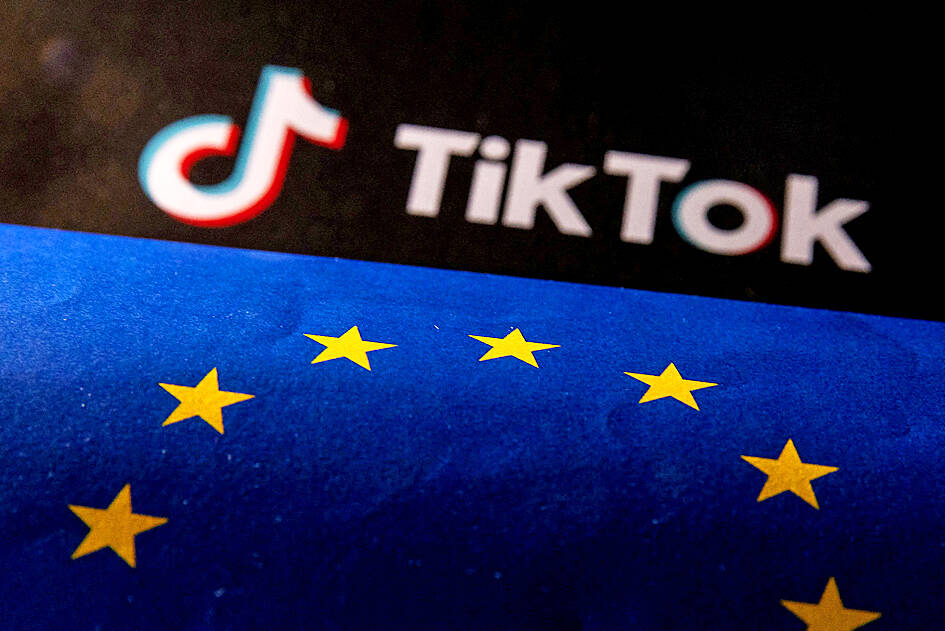TikTok owner ByteDance Ltd (字節跳動) faces the threat of hefty fines as the EU prepares a probe under its strict new content moderation rules over concerns of risks to minors.
The European Commission is to open an investigation into TikTok under the bloc’s new Digital Services Act (DSA) in the coming weeks over concerns that changes the firm made to comply with the new regulation are not enough to protect underage users, people familiar with the matter said.
This comes as ByteDance lost an EU court bid to suspend a decision by regulators to force the video-sharing social-media platform to comply with the bloc’s flagship digital antitrust rules.

Photo: Reuters
The EU’s General Court said ByteDance “has failed to demonstrate the urgency required for an interim order in order to avoid serious and irreparable damage” in an order published on Friday.
The Chinese-owned firm last year asked for interim measures alongside its appeal of the EU’s decision to put TiKTok within the scope of DSA.
If granted, this would have halted the strict scrutiny of TikTok until the outcome of the appeal.
“While we are disappointed with the decision, we look forward to having the substance of our case heard on an expedited basis,” a spokesperson for TikTok said.
The DSA gives regulators unprecedented powers to take action against major tech companies for how they handle content on their platforms. Companies face fines of as much as 6 percent of annual sales, or even risk being banned from the EU if they repeatedly break the rules.
EU regulators in December last year opened their first formal probe under the DSA into Elon Musk’s X to establish possible breaches in the way the platform handles illegal content and disinformation.
The bloc last year singled out 19 online platforms and search engines, including X, Meta Platforms Inc and Alphabet Inc, as very large — those with more than 45 million monthly active users in Europe — and has been quizzing them for information. The EU has since also added three porn sites.
The EU has sent several requests for information to TikTok since the platform was designated, enquiring among others about what steps it has taken to protect minors, especially regarding the risks to mental health and physical health, and how its services are used by children.
More investigations are likely to be added as the EU has been quizzing all designated firms for more information over the last few months. Similar to TikTok, Meta’s Instagram has also been quizzed by the EU on what changes it’s made to comply with the new rules and to assess and mitigate risks facing its underage users.

Hon Hai Precision Industry Co (鴻海精密) yesterday said that its research institute has launched its first advanced artificial intelligence (AI) large language model (LLM) using traditional Chinese, with technology assistance from Nvidia Corp. Hon Hai, also known as Foxconn Technology Group (富士康科技集團), said the LLM, FoxBrain, is expected to improve its data analysis capabilities for smart manufacturing, and electric vehicle and smart city development. An LLM is a type of AI trained on vast amounts of text data and uses deep learning techniques, particularly neural networks, to process and generate language. They are essential for building and improving AI-powered servers. Nvidia provided assistance

DOMESTIC SUPPLY: The probe comes as Donald Trump has called for the repeal of the US$52.7 billion CHIPS and Science Act, which the US Congress passed in 2022 The Office of the US Trade Representative is to hold a hearing tomorrow into older Chinese-made “legacy” semiconductors that could heap more US tariffs on chips from China that power everyday goods from cars to washing machines to telecoms equipment. The probe, which began during former US president Joe Biden’s tenure in December last year, aims to protect US and other semiconductor producers from China’s massive state-driven buildup of domestic chip supply. A 50 percent US tariff on Chinese semiconductors began on Jan. 1. Legacy chips use older manufacturing processes introduced more than a decade ago and are often far simpler than

STILL HOPEFUL: Delayed payment of NT$5.35 billion from an Indian server client sent its earnings plunging last year, but the firm expects a gradual pickup ahead Asustek Computer Inc (華碩), the world’s No. 5 PC vendor, yesterday reported an 87 percent slump in net profit for last year, dragged by a massive overdue payment from an Indian cloud service provider. The Indian customer has delayed payment totaling NT$5.35 billion (US$162.7 million), Asustek chief financial officer Nick Wu (吳長榮) told an online earnings conference. Asustek shipped servers to India between April and June last year. The customer told Asustek that it is launching multiple fundraising projects and expected to repay the debt in the short term, Wu said. The Indian customer accounted for less than 10 percent to Asustek’s

Gasoline and diesel prices this week are to decrease NT$0.5 and NT$1 per liter respectively as international crude prices continued to fall last week, CPC Corp, Taiwan (CPC, 台灣中油) and Formosa Petrochemical Corp (台塑石化) said yesterday. Effective today, gasoline prices at CPC and Formosa stations are to decrease to NT$29.2, NT$30.7 and NT$32.7 per liter for 92, 95 and 98-octane unleaded gasoline respectively, while premium diesel is to cost NT$27.9 per liter at CPC stations and NT$27.7 at Formosa pumps, the companies said in separate statements. Global crude oil prices dropped last week after the eight OPEC+ members said they would